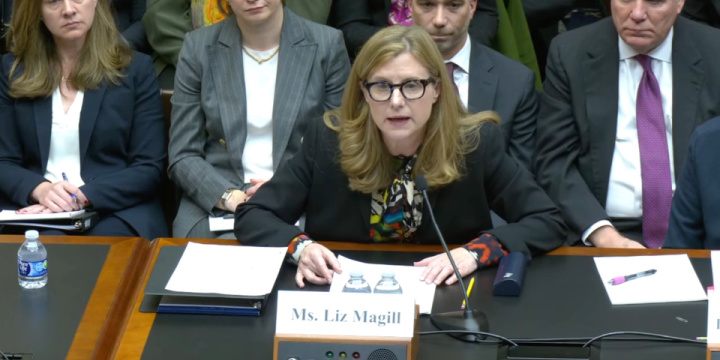US Lawmakers Grill University Presidents Over Rising Antisemitism and Anti-Israel Sentiments on Campuses Amid Alarming Incidents.
By Dion J. Pierre, Algemeiner
US lawmakers on Tuesday held a highly anticipated hearing on surging antisemitism at American universities, with members of both political parties directing sharp questions at three elite university presidents about deep hostility to Israel and the Jewish community on their campuses.
The House Committee on Education and the Workforce organized the hearing — titled “Holding Campus Leaders Accountable and Confronting Antisemitism” — amid an alarming spike in antisemitic incidents, including demonstrations calling for Israel’s destruction and the intimidation and harassment of Jewish students, at college campuses across the US.
Some of America’s most elite universities have become hubs of such activity, including Harvard University, the University of Pennsylvania (Penn), and the Massachusetts Institute of Technology (MIT).
For over three hours, presidents Claudine Gay of Harvard, Elizabeth Magill of Penn, and Sally Kornbluth of MIT largely evaded questions about the consequences of antisemitic incidents on their campuses, citing the Family Educational Rights and Privacy Act — which governs access to educational information and records by public entities — while declining to confirm whether students had been disciplined for antisemitic harassment.
All three administrators vowed to vigorously combat antisemitism but denied that their universities were responsible for fostering it, calling the rise in anti-Jewish hate a societal problem.
Addressing Jewish students’ complaints of anti-Israel bias in the classroom, Rep. Glenn Grothman (R-WI) asked Gay whether a lack of intellectual diversity on elite college campuses tips the balance of ideas in favor of far left academics who use their platforms to promote extremist anti-Zionist viewpoints.
“What I’m focused on is making sure that we are bringing the most academically talented faculty to the campus and that they’re effective in the classroom,” Gay said.
Magill also came under fire. Since September, her administration has been excoriated for refusing to cancel an anti-Zionist festival that featured several speakers who have been accused of promoting antisemitic conspiracies and violence against Israel.
The school refused to cancel the event or ask that it be hosted off-campus. Last month, Magill expressed regret and apologized for not promptly condemning the festival.
“Antisemitism has no place at Penn, and our free speech policies are guided by the United States Constitution,” Magill said, responding to questions about former Pink Floyd vocalist Roger Waters’ invitation to the event.
A recent documentary exposed several of Waters’ inflammatory antisemitic statements.
“Our approach to speech, as I identified, it follows and is guided by the United States Constitution, which allows for robust perspectives,” Magill said.
During questioning by Rep. Pramila Jayapal (D-WA), who was recently accused of minimizing the Hamas terror group’s mass rapes of Israeli women during its Oct. 7 massacre, Kornbluth said she was “deeply troubled” by recent events and overseeing several faculty attempts aimed at cooling the campus climate.
“There have been lunches, there have been meetings for our Israeli and Jewish students with Jewish faculty, for our Arab students with Arab and Muslim faculty, but now they’re working to figure out how to bring them together,” she said. “If we’re all going to live together and work together collectively, we have to move beyond formal training, which we are committed to, but to actually real dialogue, and to actually model constructive and civil dialogue for our students. That’s what being in university is all about.”
MIT officials last month told Jewish students to avoid the campus’ main building after it was taken over by anti-Israel activists.
During Tuesday’s hearing, both Democratic and Republican lawmakers condemned antisemitism but also blamed the other side for allowing anti-Jewish hate to fester.
Republicans on the committee alleged that diversity, equity, and inclusion (DEI) programs supported by the political left have fostered the kinds of tribalism that unleash antisemitism, and that progressives coddled pro-Hamas supporters.
Democrats, meanwhile, claimed that Republicans have ignored Islamophobia and aimed to defund federal institutions that monitor civil rights violations.
Nonetheless, attempts were made at bipartisanship. Rep. Virginia Foxx (R-NC), the committee’s chairwoman, quoted a Nov. 29 speech by Senate Majority Leader Chuck Schumer (D-NY) denouncing antisemitism, although she argued he fell short of recognizing how “race-based ideology” has augmented the problem.
“Senator Schumer hasn’t put the pieces together, but the picture is all too clear now to American Jews,” Foxx said to the university presidents. “Institutional antisemitism and hate are among the poison fruits of your institution’s cultures.”
Throughout her remarks, Foxx linked what she described as Harvard’s far left curriculum to its students blaming Israel for the Hamas atrocities across southern Israeli communities on Oct. 7.
In the aftermath of the onslaught, and amid the ongoing Israel-Hamas war, anti-Israel students at Harvard mobbed a Jewish law student, surrounded him, and screamed “Shame!” into his ears.
In his opening remarks, the committee’s ranking member, Rep. Bobby Scott (D-VA), argued that antisemitism on college campuses “did not start with diversity, equity, and inclusion initiatives,” while charging that Republicans squandered previous opportunities to discuss campus discrimination.
“While my colleagues claim to be committed to combating discrimination on campus, they’re also contradictorily and simultaneously stoking culture wars that can be divisive and discriminatory,” Scott charged. “Moreover, House Republicans are proposing significant cuts to the Department of Education’s Office for Civil Rights, the very office responsible for upholding students’ civil rights and investigating discrimination claims. You can’t have it both ways.”
Tuesday’s hearing came days after a new poll, released by Hillel International, found that 37 percent of Jewish college students have felt the need to hide their Jewish identity on campus since Hamas’ Oct. 7 massacre, in which some 1,200 people, mostly civilians, were murdered and 240 others taken as hostages into Gaza.
The survey also found that 35 percent of respondents said there have been acts of hate or violence against Jews on campus. A majority of those surveyed said they were unsatisfied with their university’s response to those incidents.
